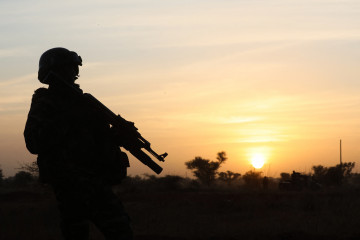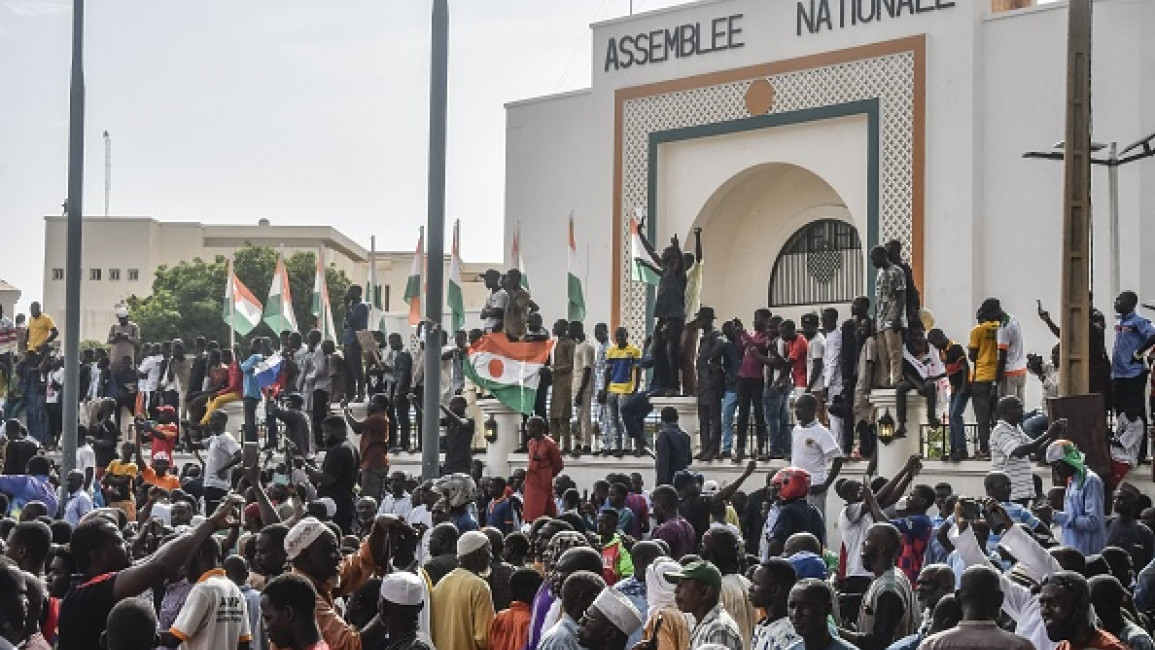

Throughout the Sahel region, states are weak and international borders are porous. Violent extremists affiliated with al-Qaeda and the Islamic State (IS) have been waging insurgencies for years, taking advantage of widespread insecurity, poverty, environmental crises, and humanitarian disasters.
Currently, hardline jihadist groups are thriving in this region more than anywhere else in the world. In 2022, there were more deaths resulting from terrorism in the Sahel than in South Asia, the Middle East, and North Africa combined.
Situated between Burkina Faso, Mali, and Niger is the Liptako-Gourma region, which has become a breeding ground for terrorist organisations. Like its neighbours, Niger has suffered from a terrorism crisis and a deteriorating security situation.
Insurgent groups have been wreaking havoc in the country since the fall of Muammar Gaddafi’s government in neighbouring Libya in 2011, which had destabilising spillover effects in Niger and other Sahelian countries.
"Gulf Arab policymakers will be closely monitoring the potential regionalisation and internationalisation of Niger's tense situation"
In 2021, terrorist organisations carried out 74 attacks in Niger. The main jihadist groups spilling blood in this landlocked country include the Islamic State in the Greater Sahel (ISGS), Islamic State West Africa Province (ISWAP), Jama’at Nusrat al-Islam wal-Muslimin (JNIM), and Boko Haram, which wage attacks elsewhere in the region too.
As a result of the relatively weak Nigerien military’s inability to effectively protect the country from these violent extremists, many segments of the country’s population have lost confidence in their government. Horrific economic conditions have also contributed to widespread opposition to the government.
Against this backdrop, an unpredictable military coup occurred on 26 July. After President Mohamed Bazoum’s own presidential guard ousted him, the coup leaders declared General Abdourahamane Tiani Niger’s new leader.
This coup followed military juntas usurping control in neighbouring Mali and Burkina Faso in 2020/21. In these two countries, the governments suffered from crises of legitimacy due to intensifying jihadist insurgencies that the states were unable to quell along with other factors such as corruption and poverty.
However, Sahel experts dismiss the notion that handing states over to military leaders and dissolving democratic institutions will lead to progress in counterterrorism. Many of the underlying socioeconomic factors that explain why terrorist organisations have thrived in the Sahel are not addressed by militaries ousting civilian leaders and placing these countries under the rule of unelected juntas.
“The lack of democratic civilian rule might lead to uncertainties and challenges in coordinating intelligence sharing and joint operations against violent extremism,” explained Fidel Amakye Owusu, a Ghana-based security analyst. “As seen in Mali and Burkina Faso, where military takeovers have occurred, the transition to military rule does not necessarily translate into peace, stability or gains in the fight against extremism.”
Within this context, it is far from guaranteed that Niger’s military junta will do any better than Bazoum’s government when it comes to trying to provide stability and security. On the contrary, the country’s security crises could exacerbate depending on how the situation in Niger pans out. Under such circumstances, ISGS, ISWAP, JNIM, and other terrorist organisations could emerge as the ultimate winners. This is a huge concern for many countries worldwide.
|
|
Enter Gulf Arab states
After last month’s coup in Niamey, Gulf Cooperation Council (GCC) member-states quickly responded. The United Arab Emirates (UAE) condemned the coup while Saudi Arabia and Qatar expressed concern about the situation.
The UAE Ministry of Foreign Affairs released a statement explaining that Abu Dhabi “condemned the coup attempt” and emphasised the importance of “maintaining stability and security in the country.” In an interview with The New Arab, Gordon Gray, a former US ambassador, said, “Defeating jihadism is the primary GCC concern vis-à-vis Niger; the salience of this objective explains the UAE’s prompt condemnation.”
Although Saudi officials refrained from using the word coup, they put out a statement saying that Riyadh is watching events in Niger with “great concern” while stressing the Kingdom’s “keenness on Niger's security and stability and the safety of its establishments” and expressing “full solidarity” with the Nigerien people. Saudi Arabia’s Ministry of Foreign Affairs called on everyone in the African nation to prioritise “the voice of reason, wisdom, and the supreme national interest.”
"Many of the GCC states are waiting to see how this whole thing shakes out, and whether Bazoum will be reinstalled or if Niger is the next domino to fall under Russian influence"
Gray told TNA, “The Saudi statement was somewhat milder [than the UAE’s] … but I do not see significant differences in perspective among the GCC states”.
Given how much uncertainty there is in Niger, experts maintain that GCC states are approaching the situation rather cautiously. “I think at the moment the GCC has adopted a ‘wait-and-see’ approach,” said Colin P. Clarke, the director of policy and research at the Soufan Group, in an interview with TNA.
“Different Gulf countries balance different relationships with governments throughout the Sahel, so I think many of the GCC states are waiting to see how this whole thing shakes out, and whether Bazoum will be reinstalled or if Niger is the next domino to fall under Russian influence,” added Clarke.
Overall, GCC states will probably be reacting to events and ongoing developments in Niger with much caution.
“Generally speaking, GCC countries have less at stake in Niger than they do in say Sudan, but they nevertheless don't exactly welcome insecurity within a region that continues to host jihadists,” Ryan Bohl, a Middle East and North African analyst at the risk intelligence company RANE, told TNA.
“From the broadest perspective, the GCC are concerned about terrorism and stability within the western Sahel in ways that might affect allies that they are closer to like Morocco and Tunisia.”
As the world waits to see how the US, France, Nigeria, Togo, and other members of the Economic Community of West African States act vis-à-vis Niger, analysts warn about the risks of a wider regional war against the backdrop of rising tensions between Niamey and foreign capitals.
Gulf Arab policymakers will be closely monitoring the potential regionalisation and internationalisation of Niger’s tense situation, especially considering how GCC states such as the UAE have investments in neighbouring countries.
On 6 August, the UAE sent armoured vehicles and other military gear to Niger’s neighbour, Chad, for counterterrorism and border security purposes, according to officials in Abu Dhabi. Chad's Defence Minister Daoud Yaya Brahim said the equipment from the UAE allows his country to bolster “defence forces in the framework of the struggle against terrorism”.
UAE state media reported that the Gulf nation and Chad signed a military cooperation deal two months ago when the Chadian president was vising the UAE.
“I think regional stability, the potential for spillover violence, and preventing civil wars in countries like Chad are all interests and concerns of GCC states,” said Clarke. “But just like the Russians, GCC states will be looking for opportunities to project influence if the chance arises and monitoring closely any potential regime changes in the region.”
|
|
Wider international context
For the US, France, and other Western countries with stakes in Niger, it is worth asking questions about the greater geopolitical picture and the extent to which Western states’ interests align with those of GCC members in the Sahelian nation.
The US, EU members, and the GCC states share an interest in Niger achieving long-term stability and playing an effective role in regional and international counterterrorism efforts. Yet, when it comes to Russia’s influence in Niger, Western states and GCC members are unlikely to see eye-to-eye.
There is no denying that officials in Washington, Paris, and other Western capitals have serious concerns about how the coup in Niger stands to further empower Russia in Africa. However, Gulf Arab policymakers, such as those in Abu Dhabi who coordinated with Moscow vis-à-vis Libya, are unlikely to be so worried about Russian clout in Niger.
“Many of the GCC states maintain good relations with Moscow, so [greater Russian influence in Niamey] wouldn’t necessarily freeze [the Gulf Arab monarchies] out of Niger,” Clarke told TNA.
“But there is the constant tug-of-war between US/Western interests and those of the Kremlin, with most GCC countries seeking to avoid being caught in the middle and forced to pick a side.”
Giorgio Cafiero is the CEO of Gulf State Analytics.
Follow him on Twitter: @GiorgioCafiero






 Follow the Middle East's top stories in English at The New Arab on Google News
Follow the Middle East's top stories in English at The New Arab on Google News


